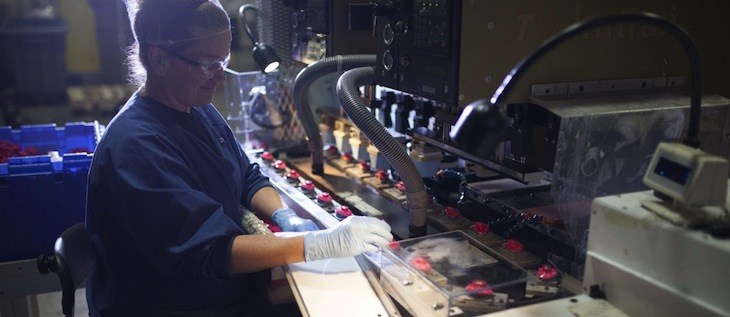Wal-Mart pleased with progress of its U.S. manufacturing agenda
by December 13, 2017 4:57 pm 1,242 views

As 2017 winds to a close, Wal-Mart continues to promote a 10-year commitment to support its U.S. manufacturing jobs initiative with the company saying it is on target to hit its goal to source $250 billion in additional goods made in the U.S. by 2023.
In June, Cindi Marsiglio, the face of the program, told suppliers at the retailer’s Open Call event the past four years had provided great insight and learnings.
“We’ve come a long way, we have learned a lot and we certainly still have more work to do. I am proud of the momentum we have been building,” said Marsiglio, vice president of U.S. sourcing and manufacturing at Walmart.
Some of the jobs created this year as a result of Wal-Mart’s commitment include:
• 70 jobs added at Mars Wrigley Confectionery in Topeka, Kan.
• 70 new jobs at WinCraft, a manufacturer of licensed sports apparel in Winona, Minn.
• 150 new support jobs created at California innovations in DeKalb, County, Ga., makers of Ozark Trail Coolers for Walmart, the plant opened in 2016 with 150 workers.
• 350 jobs at Sinomax in La Vergne, Tenn., maker of polyurethane foam bedding. Sinomax is based in China but opened a plant in Tennessee.
• Trident, based in Chino, Calif., began making cell phone cases for Walmart adding roughly 50 new jobs this year
Marsiglio said supporting American manufacturing is good for customers and the overall business and the communities in which Walmart operates. She said two-thirds of what Wal-Mart spends on products in U.S. stores is made, sourced, assembled or grown within the United States.
The Boston Consulting Group estimates Wal-Mart’s 10-year commitment through the initiative will create 250,000 direct manufacturing jobs and about 750,000 support and service jobs to the manufacturing sector.
Wal-Mart said 1,300 categories have been analyzed for economic attractiveness with respect to U.S. manufacturing. The work plan has been prioritized across the top 75 categories that make the most sense to onshore production. More than 500 unique projects have been approved across 65 departments in the past 4.5 years, according to the retailer’s website.
Harry Moser, founder of the Reshoring Initiative, has praised Wal-Mart as a contributor to this movement. He said the goal of the organization remains to bring manufacturing jobs back to the U.S. by helping companies realize that offshoring is not always the most cost-effective option.
Through the first three quarters of this year Moser estimates 180,000 jobs have been transitioned back to the U.S. Each job added is positive, but Moser said progress is slow and at the existing rate it will likely take 30 years to recoup the five million manufacturing jobs moved offshore since 2000.
Moser said the tide turned in 2016 with more U.S. jobs being added than those leaving U.S. shores. Factors that should help with reshoring include rising global transportation costs that offset cheaper production rates in Asia. He said lower energy prices have also helped trim operating costs and improve the profitability of companies with U.S. operations.
Reshoring and FDI (Foreign Direct Investment) job announcements jumped in the fourth quarter of last year. For the first three quarters of 2017 announcements are up 250% from the same period last year. The improvement appears to be in anticipation of reduced corporate tax rates and regulations plus some benefit from a moderately lower, but still high, U.S. dollar, Moser noted.
Reshoring Initiative will release a full-year 2017 report in early 2018.
